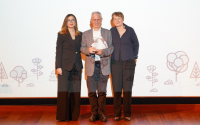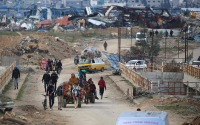13 April 2005Stephen Castle
Some of Europe's richest countries have been named and shamed for their failure to meet aid pledges, as the European Commission demanded fresh commitments to help eradicate global hunger and poverty.
Data for 2004 shows huge differences on spending, with Italy and Austria falling far short of their long-standing commitments to fund the battle against deprivation in the Third World.
The figures, from the Organisation for Economic Co-operation and Development, coincided with the launch of fresh targets for aid, which the Commission yesterday said were vital if Africa was to be levered out of poverty.
All EU countries have long been committed to spending 0.7 per cent of their gross domestic income on development aid, but Italy devotes just 0.15 per cent of its wealth to fighting global poverty.
Of the 15 countries which made up the EU before it enlarged last year, Greece has the second-worst performance with 0.23 per cent, followed by Austria on 0.24 per cent. Austria and Italy are among the EU's most prosperous nations.
Denmark and Sweden, affluent Nordic nations where non-governmental organisations are well-organised and influential, lead the pack, and the Netherlands and Luxembourg have also already matched their spending target. Several former colonial nations such as the UK, France and Belgium are about halfway to achieving the goal, though others such as Spain lag. Yesterday Louis Michel, the EU Development Commissioner, called on all member states to increase spending to a minimum of 0.51 per cent of gross national income by 2010 or, in the case of new member states, 0.17 per cent. This would be an interim target towards the pledge to spend 0.7 percent by 2015.
Highlighting the huge differences in the performance of different member states, Oxfam's spokesman, Louis Belanger, said: "For the Italians and Austrians it is difficult to justify lagging so far behind. The Commission's proposals are a step in the right direction. If these targets are not met there is no way the Millennium Goals can be achieved. "If the EU can bring Italy from 0.17 per cent to 0.51 per cent it would be amazing. At the same time it is not ambitious enough; we need new money and we need it now."
Earlier this year, non-governmental organisations produced their own report castigating member states for their failure to act over development aid, debt relief and trade policies.
All 191 UN countries are committed to help eradicate extreme hunger and poverty by 2015. In particular, the Millennium Development Goals aim to reduce by half the proportion of people living on less than one dollar a day, and reduce by two-thirds the mortality rate among children under five.
Mr Michel said his plans - which need to be approved by ministers - would mean an increase annually of some €20bn (£14bn) in 2010. He said: "We have a responsibility of human solidarity, but it is also in our own interest. If we want a more stable and safer world, we have to develop more, we have to invest more in development now."
He also said any ideas being floated for alternative ways of financing aid, such as special taxes on aviation fuel or airline tickets, should be used to produce additional revenue, rather than to plug the gap.Britain, France, Finland, Ireland, Belgium and Spain have fixed timetables to hit the 0.7 per cent target by 2015.
The United Kingdom has also highlighted the plight of Africa as a key priority during its presidency of the G7 this year, and of the European Union, which it takes up in July.
Donations
* NORWAY 0.92
* DENMARK 0.84
* LUXEMBOURG 0.81
* NETHERLANDS 0.80
* SWEDEN 0.79
* BELGIUM 0.60
* FRANCE 0.41
* SWITZERLAND 0.39
* REP. OF IRELAND 0.39
* FINLAND 0.35
* UK 0.34
* GERMANY 0.28
* SPAIN 0.23
* PORTUGAL 0.22
* GREECE 0.21
* AUSTRIA 0.20
* ITALY 0.17






